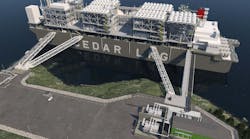Pakistani ruler Gen. Pervez Musharraf said Pakistan and India would have to cooperate in the development of oil and gas. In particular, he urged India to support the proposed Iran-Pakistan-India gas pipeline route.
The controversial route would require India's gas supplies from Iran to pass through Pakistan. Tensions between India and Pakistan often run high.
Musharraf also called for more investment in the country's transportation infrastructure. "Pakistan and India, at some level, have to join hands and cooperate in this field. It is a geographical reality, whether someone likes it or not," he told the concluding session of the 3-day Pakistan Oil and Gas Conference 2000, which ended Tuesday.
Expressing his full support of the proposed Iran-Pakistan-India route, the chief executive said, "We are prepared to give any reasonable guarantees to our neighbor."
The proposed route would earn Islamabad millions of dollars, Musharraf said. He also said India was in need of a large quantity of gas, hence, he said, the "assurances we are giving them have to be taken seriously."
The gas pipeline project would bring benefits to all the countries concerned, he said. Given Pakistan's strategic location, it could have access to the central Asian states, the Middle East, and energy-deficient countries of the South Asia. Musharraf said two other very important projects to import gas from Turkmenistan and Qatar to Pakistan were underway, as the countries concerned were eager to lay down the gas pipelines. The heads of state of Turkmenistan and Qatar, he said, were fully supportive of these projects.
The government has adopted a strategy to get things moving, he said. During the past 12 months there has been a commitment of $700 million of investment in the oil and gas sector for the next 3 years.
But, Musharraf said, "it is less than the potential we have," and urged the investors to improve it.
The government has formulated a strategy for the development of infrastructure for oil and gas transmission. This strategy envisages the supply of gas to every industry and the domestic consumers.
The government would welcome the investment in this area both from within the country as well as from abroad, said Musharraf.
He assured the foreign investors that their investment in Pakistan would be safe. He said it was a wrong perception that environment in Pakistan was not friendly to investors. Musharraf said he would not like any investors to leave Pakistan owing to shortcomings of the government.
"My government is determined to do everything possible to ensure and maintain the confidence of the investors," he said.
In an address of welcome at the conference, Pakistani Petroleum Minister. Usman Aminuddin said the contract for the White Oil Pipeline, from Karachi to Multan, is expected to be awarded by the end of this year.
"This project will cost close to $600 million and will greatly help to reduce pressure on the road because of reduced movement of oil tankers," he said.
Aminuddin said units of Royal Dutch/Shell Group and Caltex have agreed to participate in the project, depending on the final cost, by about $35 million and $15 million respectively.
The government of Abu Dhabi will contribute $28 million towards the equity of the project, he added.
The conference was jointly organized by local public relations company M/S Mediators Pvt., Economic Conferences, and the Pakistan Institute of Petroleum.
